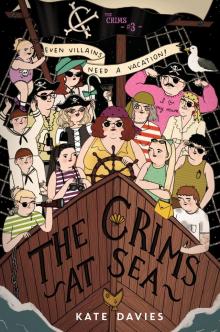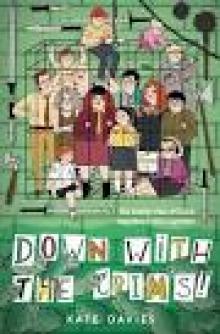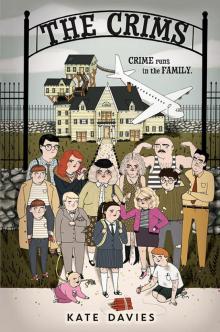- Home
- Kate Davies
The Crims #2 Page 4
The Crims #2 Read online
Page 4
Ava turned to Imogen and smiled her toothy smile. “I don’t mind if you go first, Imogen,” she said.
“That’s okay,” said Imogen. “You go first. I insist.”
“You’re just being modest,” said Ava, still smiling.
“I’m not. I’m being polite,” said Imogen, whose smile was beginning to crack like a nasty egg.
“But I’m too shy to go first,” said Ava, batting her suspiciously long eyelashes.
“That settles it, then!” said Mr. Fry. “Miss Crim will speak first. Just remember: no swearing, no violence, no incitement to violence, no threats, no describing murders in disturbing detail, no references to Fiddler on the Roof, no tap-dancing, and absolutely no distracting the class so that your cousins can come and pickpocket everyone before your speech is over.” He patted his pocket to make sure his wallet was still there.
Imogen walked with purpose to the front of the room and cleared her throat. She opened her mouth to speak—and suddenly realized she had absolutely no idea what to say. She thought she’d left speech giving behind at Lilyworth, along with her hopes of being a future world leader and a secret supply of pretzels (which were probably past their sell-by date now anyway). Since when was public speaking a thing at state schools?
Just say something. Anything, she told herself. Come on. “Kill it. Garrote it. Slay it, murder it, make it beg for mercy . . .”
Mr. Fry’s bow tie looked like it was trying to escape from his neck. Which is how Imogen realized she’d been speaking out loud.
Think fast. “. . . which, where I come from, means ‘I’m so happy to be here at Blandington Secondary School, and whatever you’ve heard, I’ve never harmed anyone intentionally with a pencil sharpener.’”
The other kids looked at one another, confused and a little nervous. Hannah frowned at Imogen and mouthed, “You okay?”
This was not going well.
Don’t panic, Imogen thought. You can still pull this back. She took a deep breath. Maybe it was time to tell the truth. . . .
“Some of you may have heard that until a few weeks ago, I was at the top of my class at Lilyworth Ladies’ College. I left because my family was wrongly accused of stealing a very valuable lunch box from a toilet entrepreneur, and I had to prove that they were innocent. Which I did. I successfully investigated the theft of the lunch box, secured my family’s freedom, and now here I am, starting a new school, seizing the day, as Horace would put it—”
“Is Horace your boyfriend?” asked a boy in the front row.
“He’s a famous Latin poet, actually,” said Ava.
“Thank you, Ava,” said Imogen, forcing herself to smile. She took a deep breath, gearing up for her big finish. “And as that other great Latin poet Catullus once said—”
BRRRRIIIIIIIIIIIIIIIIIIIIING!
“Ooh!” said Mr. Fry, jumping up, a little too happy that Imogen’s speech had been interrupted. “That’s the fire alarm! Quiet now, everyone. . . . Leave the room in single file . . .”
What’s a girl got to do to finish a monologue in this town? Imogen thought as she followed the rest of the class into the courtyard.
The good thing about having a clique is that it doesn’t matter how badly your speech has gone, or how terrified your teachers are of you, or how much your school uniform makes you look like large human trout—they’ll always make you feel better.
“You killed it,” said Hannah.
“You slayed,” agreed Willa.
“You made it beg for mercy,” said Penelope.
“I didn’t,” said Imogen, scuffing her shoe on the pavement. “I just sort of slightly injured it.”
“Imogen!” Delia was walking toward her across the courtyard.
“Let’s get out of here,” Hannah muttered.
“You’re not scared of Delia, are you?” Imogen asked.
“She is quite violent,” said Willa. “Particularly in the mornings.”
“She threw me across the science lab because I wouldn’t let her borrow my fountain pen,” said Penelope.
“She does have a surprising amount of upper body strength,” Imogen said thoughtfully, remembering the time Delia had picked up Uncle Clyde and tossed him across the living room for calling her “sweetheart.” “But once you get to know her, she’s really not that bad. . . .”
“She’s bad enough,” said Hannah. “See you later, Imogen.” She linked arms with Penelope and Willa and made for the benches on the other side of the schoolyard.
Imogen went to follow them, but Delia grabbed her with her surprisingly strong arms and yanked her backward.
“Wait,” said Delia. “What are you doing for the rest of the day?”
Imogen frowned, confused. “Going back to class, as soon as they figure out how to turn off the fire alarm.”
“No you’re not,” said Delia, still holding on to her arm.
“Yes I am,” said Imogen, pulling herself free.
“You’re not. Because that would be a waste,” said Delia, giving her an evil grin.
“A waste of what?”
“Of the fire alarm, stupid. Who do you think set it off?” Delia pointed to herself, in case Imogen hadn’t gotten the message.
“Delia,” Imogen said wearily. “You’re too old to pull stupid stunts like that. You disrupted everyone’s morning and wasted valuable learning time. Plus, you ruined the end of my speech. You always ruin the ends of my speeches.”
“It wasn’t a stupid stunt,” said Delia, pouting. “It was a very effective stunt. Now no one’s going to notice when we sneak out of school.” She started marching Imogen toward the gates.
“I’m not sneaking anywhere,” said Imogen, disentangling herself again. “I have a school to control and a new nemesis to destroy.”
“You have the Kruks to destroy. Isn’t that more important? I was thinking we could make a plan—”
“I have a plan,” said Imogen, crossing her arms. “I plan to graduate first in my class. I’ll deal with the Kruks in the evenings, when everyone else is eating Cheetos and watching Gilmore Girls for the hundredth time on Netflix.”
Delia shook her head, disgusted. “Whatever. You’re just a teacher’s pet, like you always have been.”
The other students were beginning to filter back into their classes. Imogen didn’t have time for this ridiculous argument. “You can call me whatever you want—”
“Idiot! Loser! Law-abiding citizen!”
“Hey,” Imogen protested, stung. “That last one was below the belt. It’s totally possible to do well at school and be a brilliant criminal at the same time. Geometry comes in very handy during jewel heists. And chemistry is basically Poison 101.”
“You tell yourself that,” Delia said. “You always have to be better than everyone else, don’t you?” Her eyes were beginning to shine suspiciously. She was actually upset, Imogen realized. She was genuinely hurt that Imogen wouldn’t skip school with her.
“Wait,” said Imogen. “Delia—”
But Delia had marched out of school and was already disappearing down the road, getting harder and harder to see, like the little numbers at the bottom of an eye test.
Imogen felt a twinge of guilt, but she shook it off. She and Delia had been spending way too much time together over the past few weeks, and it always seemed to be on Delia’s terms. Imogen had lost count of the horrible pink outfits they’d shoplifted, and the terrible romantic comedies they’d sneaked into at the movies to watch without paying, and the number of times they had listened to Kitty Penguin’s album on repeat. The words to every awful song were now taking up valuable space in Imogen’s valuable brain—space that could have been used to remember pi to forty decimal places, or the reigns of all of the kings and queens of England, or the names and fatal flaws of all of the Kruks. . . . It would probably be for the best if she and Delia spent some time apart. Imogen was obviously getting on Delia’s nerves as much as Delia was getting on hers, and it would be good for them to hang out with new people for a whi
le. Besides, said a mean little voice inside Imogen, Delia will get in the way of my quest to be queen bee.
Imogen was now standing on her own in the empty courtyard. She was late for class, and she was never late for class, not even on the day she had been arrested for aiding and abetting Big Nana in the Bookstore Break-In, three years ago. In fact, Imogen had persuaded PC Donnelly to grant her bail, turned up ten minutes early for class, and answered the question about oxbow lakes before anyone else.
Imogen ran back to class and burst through the classroom door, out of breath.
“You’re late!” said Mr. Fry. And then he remembered who he was speaking to. “Which doesn’t matter at all! Be as late as you’d like!” He laughed nervously, and then he started choking, and Ava had to jump up from her seat and slap his back until he got himself under control.
“Thank you, Ava,” said Mr. Fry, with a sickening smile—the sort of smile Imogen had prompted from teachers at Lilyworth. “Now, my dear, are you ready for your speech?”
“Sure,” said Ava, taking her place at the front of the room.
Ava actually looked a little nervous. Maybe she would be a terrible public speaker! Maybe everyone would realize that Ava was actually pretty average and come flocking to Imogen’s delightful hive for some queen bee honey (or something that sounded less disgusting).
But then Ava planted her feet in the traditional speech-giving position and pulled out a stack of note cards—pale gray ones that matched the school color, yet looked chic at the same time, which should have been impossible. She had actually written her speech out. She was PREPAREDD. That’s “prepared” with capitals P-R-E-P-A-R-E-D and an extra D on the end for good measure.
Ava gave a modest smile—just the right amount of modest, just the right amount of smile—and started to speak. “I come from a little place called London—not sure if you’ve heard of it?” she said. “My family moves around a lot, because of . . . reasons.” Creating an air of mystery. A classic move. Why hadn’t Imogen thought of that? “But nowhere has ever really felt like home. Until now.”
“Aaaaaaw,” said everyone in the classroom.
“It’s true,” said Ava, beaming. “There’s something about Blandington that makes me feel like I’ve lived here all my life.”
Imogen’s stomach gave a twist. She looked around the room. The boys were staring at Ava like they wanted to date her. Damn it, the girls were staring at Ava like they wanted to date her.
No doubt about it—Ava was killing it way harder than she had. I hate her, thought Imogen.
“And—maybe it’s because I don’t know how long I’m going to be here—but I’m not really that worried about being popular. What I really want is to be a part of the Blandington community and to make everyone’s lives better in any way I can.” With that, Ava stepped back, and she actually took a little bow.
Mr. Fry jumped to his feet and started to applaud. One by one, the students followed suit. Ava was getting a standing ovation.
Imogen felt as though she was about to be sick.
“Well,” said Mr. Fry, when the applause had died down several very long minutes later. “Wasn’t that just fantastic?”
The class agreed that Ava’s speech was fantastic.
“So, Ava, you want to help the community?” said Mr. Fry.
“More than anything,” chirped Ava, eyes twinkling.
“That’s marvelous. Because we have a charity drive coming up!”
“Wonderful!” said Ava, clapping her perfectly manicured hands. “Do you need someone to head it up?”
“Actually, yes we do!” said Mr. Fry.
Imogen stood up. “I volunteer to lead the charity drive too!” she cried.
Mr. Fry looked nervously at Imogen. “Are you sure?” he said. “Are you sure you wouldn’t rather be—I don’t know—robbing a bank or something? Which would be totally fine, by the way, I’m not judging.”
“I’m sure,” Imogen said in her steeliest voice.
“All right,” said Mr. Fry, adjusting his bow tie, which seemed to be twitching around nervously. “You and Ava can be co-chairs.” He turned to the rest of the classroom. “Aren’t our new students generous?” he asked. “You could all learn a thing or two from them!”
But Imogen was barely listening. Ava was smiling at her—a smile as cold as a shark’s smile would be if the shark had been stuck in a freezer in the Arctic for five years. Imogen forced herself to smile back. Her smile was as cold as a polar bear’s smile would be if it went to open the freezer to grab itself an ice cream and found a shark in there smiling back.
What was it that Big Nana had always said? “Keep your friends close. Keep your enemies closer. And keep your nemesis so close that if you get the flu, she’ll be sick in bed for a week.”
CHAPTER FOUR
IMOGEN LOOKED FOR Delia after school, but it seemed that Delia had already left—if she’d ever come back from skipping class. She must be really angry, Imogen thought. Whenever Delia was angry, someone somewhere suffered, and Imogen knew that this time, that someone would be her.
So Imogen went home, consulted the whiteboard, and looked up her crime homework: build a diorama of the perfect dungeon in which to let your enemies rot. No glitter, please! It gets everywhere.
Suddenly tired, Imogen decided to lie down on her bed and have a think. I do all my best thinking horizontally, she told herself, even though that wasn’t entirely true. The next thing she knew, it was dark outside, and someone was knocking on her door and shouting “Imogen! Are you in there?”
Delia.
Maybe she’s here to apologize, thought Imogen. Maybe she’s grown up a bit, and she knows she was being unreasonable about the whole you-have-to-skip-school thing.
But of course she wasn’t. She was Delia, after all.
Imogen opened the bedroom door, and Delia pushed her way inside and sat down on the bed. “If I were you, I’d redecorate,” she said, bouncing on the mattress, which everyone knows is bad for the springs. “I mean, you still have a poster of the Hatton Garden robbers up in here. They’re so 2015.”
“Haven’t had time yet,” said Imogen, sitting down next to Delia.
Delia edged away from Imogen, a disgusted look on her face. “What are you doing? I haven’t come up here to hang out with you. As if! I was sent up to find you. Everyone’s wondering where you are. It’s the family meeting tonight. Remember?”
Ugh. Imogen did remember. The weekly meetings were part of Big Nana’s “family rebuilding plan,” now that she was back from the not-really dead. For some reason she thought that getting all the Crims together in one room to talk through their problems would help them bond and reconnect. But it was quite clear to Imogen that getting all the Crims together in one room on a regular basis would be a lot like reenacting the Battle of the Somme over and over again. Some or all of them would end up dead. The others would be traumatized forever. But still, Big Nana knew best. Or so she believed.
“This is going to be awful,” said Imogen.
“I know,” said Delia. And she gave Imogen a half smile before remembering that she was angry with her, and scowling again.
Good, thought Imogen. So she doesn’t completely hate me. . . .
“Are you worried about the Kruks, then?” Delia asked as they trudged downstairs to the main part of the house.
“I don’t know,” said Imogen, feeling a bit overwhelmed. “Big Nana says they’re after us, so I guess we should believe her. But why would they be?”
“No idea. Big Nana isn’t usually wrong about things like this, though. There must be something she’s not telling us.”
“There always is,” said Imogen with a grim smile.
They had reached the living room. Imogen was about to open the door, but Delia stopped her. “Hey,” she whispered, grinning. “Why don’t we investigate? Find out what Big Nana’s keeping from us?” She was excited, the way she used to be before she decided excitement wasn’t cool. “We can totally figure out wha
t’s going on. Want to meet up tomorrow before school and make a plan?”
Imogen wanted to say yes—but then she thought about her crime timetable, and about her schoolwork, and about the charity drive she was supposed to be heading up. “I’m sorry,” she said, shaking her head. “I don’t have time.”
Delia scowled. “You mean you don’t have time for me,” she said. “Not since you’ve got your old clique back, anyway.” She pushed open the living room door and took the last remaining seat on the sofa.
“You’re here!” said Big Nana, waving to Imogen, who was hovering by the entrance. There was something different about the way her grandmother looked tonight. And then Imogen realized: She was wearing a caftan—a kind of floaty tunic favored by the sort of people who like incense and meditation and songs about sharing and rainbows. What madness was this? “Wonderful,” said Big Nana in the calm, waft-y voice of a person who wears caftans. “Let’s get started. Now, I read a lot of self-help books while I was pretending to be dead—How to Kill Friends and Intimidate People was particularly instructive—and I picked up many great tips and techniques for improving family dynamics.”
Imogen had a feeling that that would take more than a self-help book; the adult Crims were all shouting at one another and didn’t seem to have heard Big Nana, and the Horrible Children were busy ignoring her too. Henry was strumming the electric guitar that Delia had stolen for him in a moment of insanity, singing a song called “I Hate Everything Except Knives and Fire”; Nick and Nate were practicing football throws by tossing Isabella back and forth; and Sam was throwing jail-y babies at everyone. (Jail-y babies are like jelly babies, except they’re shaped like famous criminals—the blackcurrant flavor is Jack the Ripper!) But Big Nana carried on regardless.
“Does anyone have any concerns that they’d like to raise at this stage?” she asked.
The Crims raised their concerns very loudly, all at once.
“Clyde keeps eating my porridge,” Josephine complained.
“I hate everyone,” said Aunt Bets.
“I DON’T UNDERSTAND WHY WORLD PEACE ISN’T A THING!” shouted Uncle Knuckles.

 The Crims #3
The Crims #3 In at the Deep End
In at the Deep End The Crims #2
The Crims #2 The Crims
The Crims Take a Chance on Me: Lessons, Book 4
Take a Chance on Me: Lessons, Book 4